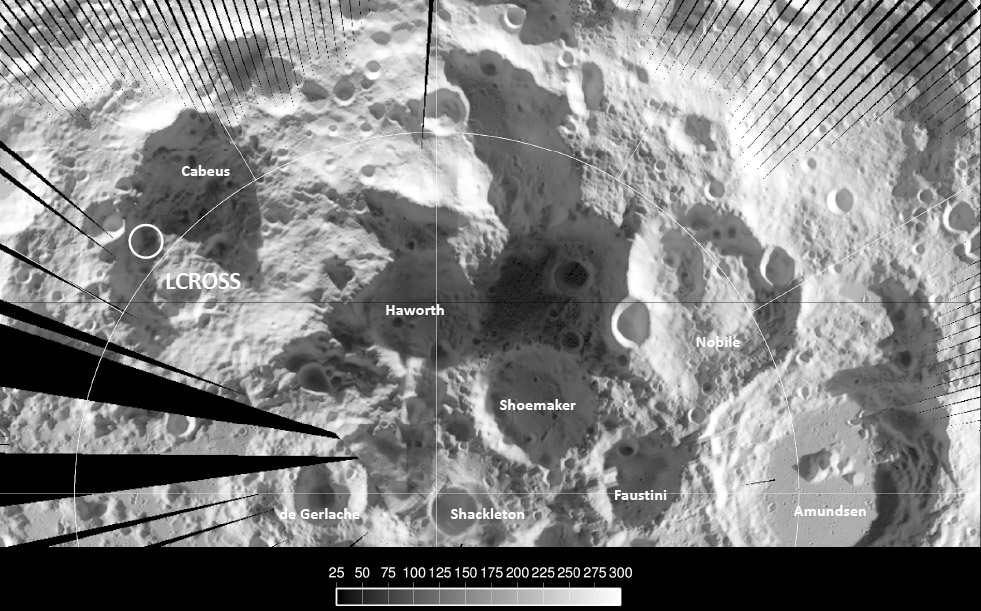Difference between revisions of "December 16, 2009"
(Created page with "__NOTOC__ =Snow At the Pole?= <!-- ws:start:WikiTextHeadingRule:1:<h1> --> <!-- ws:start:WikiTextLocalImageRule:16:<img src="/file/view/LPOD-Dec16-09.jpg/109...") |
|||
| (9 intermediate revisions by the same user not shown) | |||
| Line 1: | Line 1: | ||
__NOTOC__ | __NOTOC__ | ||
=Snow At the Pole?= | =Snow At the Pole?= | ||
| − | + | <!-- Start of content --> | |
| − | + | <!-- ws:start:WikiTextHeadingRule:1:<h1> --> | |
| − | + | <!-- ws:start:WikiTextLocalImageRule:16:<img src="/file/view/LPOD-Dec16-09.jpg/109788193/LPOD-Dec16-09.jpg" alt="" title="" style="width: 950px;" /> -->[[File:LPOD-Dec16-09.jpg|LPOD-Dec16-09.jpg]]<!-- ws:end:WikiTextLocalImageRule:16 --><br /> | |
| − | <em>image from AGU presentation by [mailto:tychocrater@yahoo.com Chuck Wood]</em><br /> | + | <em>image from AGU presentation by [http://www.nasa.gov/pdf/412260main_LRO_AGU_09_forweb.pdf David Paige], NASA/UCLA (temperatures in K)</em><br /> |
| + | <br /> | ||
| + | It is rare that snow is observed at the lunar south pole, and despite the way it looks, this isn't snow. The Lunar Reconnaissance Orbiter now circling the Moon carries an instrument called Diviner that images in the infrared. The signal detected is far in the IR, apparently from 50 to 100 microns. I say apparently because the caption for this image says it was obtained with the <em>Band 8</em> filter, but the [http://www.diviner.ucla.edu/overview.html website] doesn't number them that way. The press-release science discovery is that the permanently shadowed crater floors are colder (-238 C) than anticipated, but these images that see in the dark also provide topographic details that are otherwise invisible. Compare with the Clementine [[October_21,_2006|version]] of the image. I haven't done a detailed survey but there is nothing on the crater floors that looks unusual - if there is ice here - and LCROSS proved there is - then it doesn't show up as glaciers (no one thought it would!) or other unusual morphologies. But with higher resolution it might be possible to see some peculiarities due to vaporization of ice by small impacts. <br /> | ||
| + | <br /> | ||
| + | <em>[mailto:tychocrater@yahoo.com Chuck Wood]</em><br /> | ||
<br /> | <br /> | ||
<strong>Related Links</strong><br /> | <strong>Related Links</strong><br /> | ||
| − | Rükl plate [ | + | Rükl plate [https://the-moon.us/wiki/R%C3%BCkl_73 73]<br /> |
<br /> | <br /> | ||
<hr /> | <hr /> | ||
| − | + | <table class="wiki_table"> | |
| − | + | <tr> | |
| − | + | <td> <!-- RemoveRevolverMaps --> | |
| − | ---- | + | <!-- RemoveRevolverMaps --> |
| − | + | </td> | |
| − | + | <p><b>Yesterday's LPOD:</b> [[December 15, 2009|Not the Aurora]] </p> | |
| + | <p><b>Tomorrow's LPOD:</b> [[December 17, 2009|Coming Soon To an Eyepiece Near You]] </p> | ||
| + | <!-- End of content --> | ||
| + | {{wiki/ArticleFooter}} | ||
Latest revision as of 17:44, 13 October 2018
Snow At the Pole?

image from AGU presentation by David Paige, NASA/UCLA (temperatures in K)
It is rare that snow is observed at the lunar south pole, and despite the way it looks, this isn't snow. The Lunar Reconnaissance Orbiter now circling the Moon carries an instrument called Diviner that images in the infrared. The signal detected is far in the IR, apparently from 50 to 100 microns. I say apparently because the caption for this image says it was obtained with the Band 8 filter, but the website doesn't number them that way. The press-release science discovery is that the permanently shadowed crater floors are colder (-238 C) than anticipated, but these images that see in the dark also provide topographic details that are otherwise invisible. Compare with the Clementine version of the image. I haven't done a detailed survey but there is nothing on the crater floors that looks unusual - if there is ice here - and LCROSS proved there is - then it doesn't show up as glaciers (no one thought it would!) or other unusual morphologies. But with higher resolution it might be possible to see some peculiarities due to vaporization of ice by small impacts.
Chuck Wood
Related Links
Rükl plate 73
Yesterday's LPOD: Not the Aurora
Tomorrow's LPOD: Coming Soon To an Eyepiece Near You
COMMENTS?
Register, Log in, and join in the comments.



